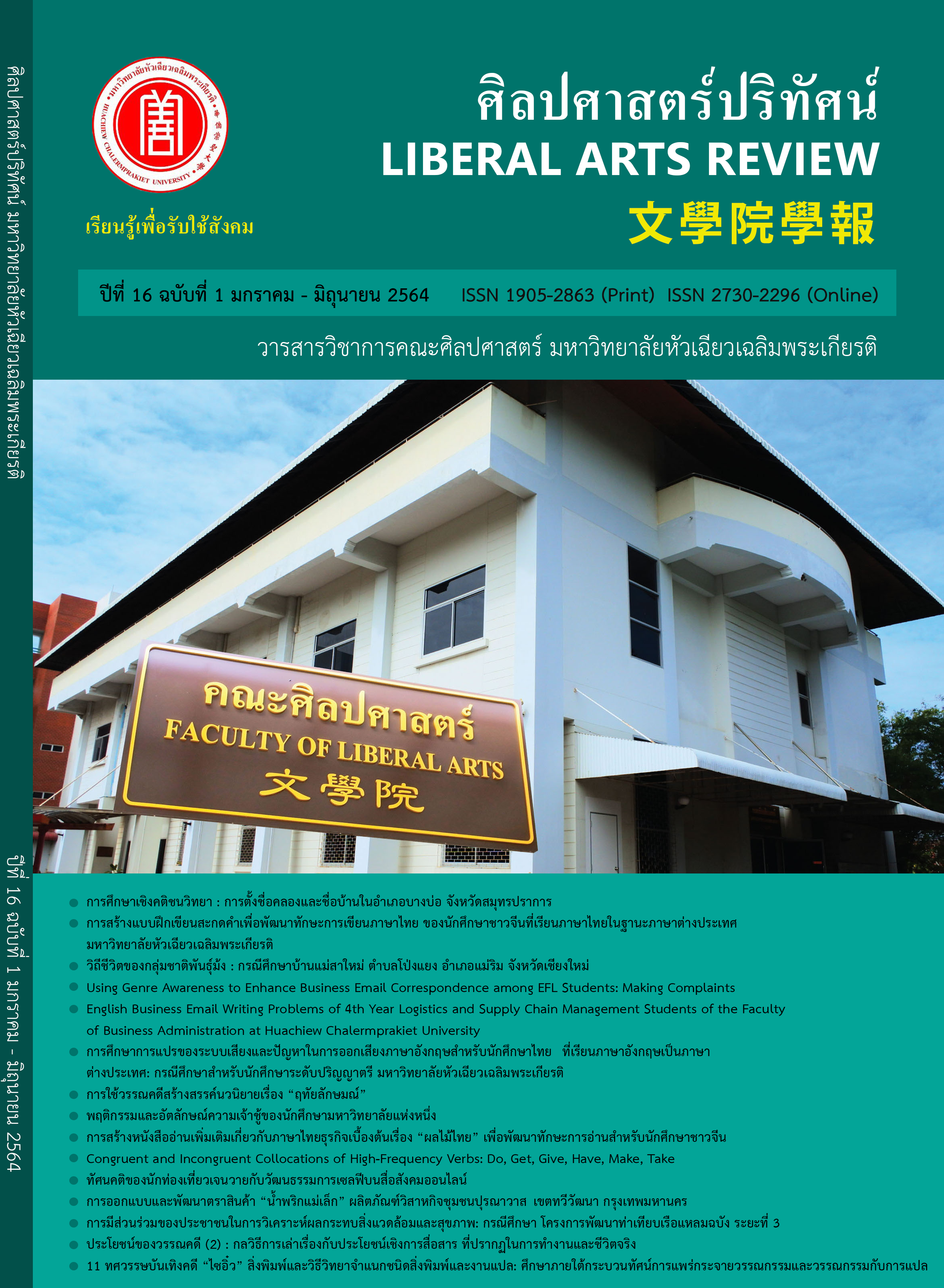Way of Life of Hmong Ethnic Group :
The case study of Ban Mae Sa Mai, Pongyang Sub-district, Maerim District, Chiangmai Province
Keywords:
way of life, Hmong ethnic group, Ban Mae Sa MaiAbstract
This article aims to study the way of life of Hmong ethnic group in Ban Mae Sa Mai, Pongyang Sub-district, Maerim District, Chiangmai Province. This Research is a qualitative research that studies data from documentation and in the field by using both participatory observations, non-participatory observations and in-depth interviews by interviewing the sample group or until the data is saturated and meets the research’s objective.
The research finds that the way of life of Hmong ethnic group at Ban Mae Sa Mai consists of three aspects: 1) Lifestyle, this group of people continuously practice their the traditional way of life 2) Culture, the art on fabric of their costume, which represent their beliefs, rituals and wisdom that they maintain and inherit strictly from their ancestors. 3) Tradition, the people practice their traditional way of life and social traditions according to their own process. In addition, they inherit their own way of life through important elements such as family members, community cooperation and support from government and associations. Consequently, they remain distinct on their own identity. However; despite the rapid change and development of the society, Hmong ethnic group is able to maintain and inherit their own way of life until the present day.
References
กระทรวงการพัฒนาสังคมและความมั่นคงของมนุษย์. (2558). แผนแม่บท การพัฒนากลุ่มชาติพันธุ์ในประเทศไทย (พ.ศ.2558-2560). กรุงเทพมหานคร: กระทรวงการพัฒนาสังคมและความมั่นคงของมนุษย์.
คณะกรรมการฝ่ายประมวลเอกสารและจดหมายเหตุ. (2542). วัฒนธรรม พัฒนาการทางประวัติศาสตร์ เอกลักษณ์ และภูมิปัญญาจังหวัดเชียงใหม่. กรุงเทพมหานคร: กระทรวงมหาดไทย.
เจิด ถนอมรุ่งเรือง. (9 มิถุนายน 2563). สัมภาษณ์.
ชยุติ ผลชวนปัญโญ. (2543). การจัดการทรัพยากรธรรมชาติและสิ่งแวดล้อมตามแนววัฒนธรรมชุมชน : กรณีศึกษาบ้านแม่สาใหม่ ตำบลโป่งแยง อำเภอแม่ริม จังหวัดเชียงใหม่. (วิทยานิพนธ์ศิลปศาสตรมหา บัณฑิต) มหาวิทยาลัยเชียงใหม่, เชียงใหม่.
เชา แซ่โซ้ง. (8 มิถุนายน 2563). สัมภาษณ์.
ณิชกานต์ ดวงศรี. (2551). การทอผ้ากับวิถีชีวิตชาวบ้านวังแท่น ตำบลผาน้อย อำเภอวังสะพุง จังหวัดเลย. (วิทยานิพนธ์ศิลปศาสตรมหาบัณฑิต) มหาวิทยาลัยราชภัฏเลย, เลย.
นา แซ่เฒ่า. (11 มิถุนายน 2563). สัมภาษณ์.
พรชัย ภูสิริพัฒนานนท์. (18 ตุลาคม 2563). สัมภาษณ์.
พวงเพชร สุรัตนกวีกุล. (2542). มนุษย์กับสังคม. (พิมพ์ครั้งที่2). กรุงเทพมหานคร: โรงพิมพ์ มหาวิทยาลัย
ธรรมศาสตร์.
มูลนิธิสารานุกรมวัฒนธรรมไทย ธนาคารไทยพาณิชย์. (2542). สารานุกรมวัฒนธรรมไทย ภาคเหนือ. กรุงเทพมหานคร: สยามเพรส แมเนจเม้นท์.
ยี แซ่ย่าง. (10 มิถุนายน 2563). สัมภาษณ์.
ลีศึก ฤทธิ์เนติกุล. (2540). การปรับตัวกับวิถีชีวิตใหม่ในชุมชนเมืองของชาวเขาเผ่าม้ง: กรณีศึกษาเขตอำเภอเมือง เชียงใหม่. เชียงใหม่: ศูนย์พัฒนาและสงเคราะห์ชาวเขาจังหวัดเชียงใหม่ กรมประชาสงเคราะห์.
วาทินี คุ้มแสง. (2553). ประเพณีของชาวม้ง : กรณีศึกษาชุมชนในศูนย์พัฒนาโครงการหลวงหนองหอย ต.แม่แรม อ. แม่ริม จ.เชียงใหม่. (วิทยานิพนธ์ปริญญามหาบัณฑิต) มหาวิทยาลัยราชภัฏเชียงใหม่, เชียงใหม่.
เศกสิทธิ์ ปกรสิทธิ์. (18 ตุลาคม 2563). สัมภาษณ์.
ไหม แซ่โซ้ง. (10 มิถุนายน 2563). สัมภาษณ์.
อันไช แซ่ย่าง. (21 ตุลาคม 2563). สัมภาษณ์.
อัมพร แซ่ย่าง. (21 ตุลาคม 2563). สัมภาษณ์.
อาภาพัชร์ ช่อเรืองสิทธิ์. (10 มิถุนายน 2563). สัมภาษณ์.
Downloads
Published
How to Cite
Issue
Section
License
บทความที่ได้รับการตีพิมพ์เป็นลิขสิทธิ์ของวารสารศิลปศาสตร์วิชาการและวิจัย
ข้อความที่ปรากฏในบทความแต่ละเรื่องในวารสารวิชาการเล่มนี้เป็นความคิดเห็นส่วนตัวของผู้เขียนแต่ละท่านไม่เกี่ยวข้องกับมหาวิทยาลัยหัวเฉียวเฉลิมพระเกียรติ และคณาจารย์ท่านอื่นๆ ในมหาวิทยาลัยฯ แต่อย่างใด ความรับผิดชอบองค์ประกอบทั้งหมดของบทความแต่ละเรื่องเป็นของผู้เขียนแต่ละท่าน หากมีความผิดพลาดใดๆ ผู้เขียนแต่ละท่านจะรับผิดชอบบทความของตนเองแต่ผู้เดียว




